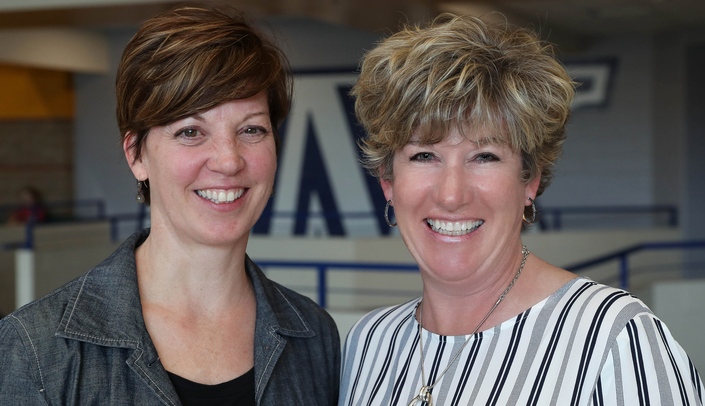Researchers at the University of Nebraska Medical Center and the University of Nebraska at Kearney are about to launch a collaboration aimed at reducing childhood obesity in rural communities by making a good thing better.
The five-year, $2.5 million grant from the Centers for Disease Control and Prevention (CDC), was awarded to Jennie Hill, Ph.D., associate professor of epidemiology in the UNMC College of Public Health, and Kate Heelan, Ph.D., professor of exercise science and director of the Physical Activity and Wellness Lab at UNK.
The grant will be split – $1.3 million to UNMC and $1.2 million to UNK. UNK’s portion of the grant funding is the largest current research award for the university and one of the largest in school history. It’s the first-ever CDC research grant awarded to UNK.
They plan to repackage an already successful healthy living program called Building Healthy Families, which was developed by Dr. Heelan and her team in 2009, and replicate it in smaller communities across the country. The free, 12-week program is designed for families with children ages 6-12 and teaches them to identify better food choices, modify unhealthy behaviors and increase physical activity.
Data collected during preliminary and follow-up assessments by faculty from UNK's Department of Kinesiology and Sport Sciences shows the program has been successful in promoting excess weight loss, muscle gain and improved health for both adults and children.
The CDC reports that obesity affects nearly one in five children in the U.S., with higher rates in lower-income families and rural areas that don't have access to the same resources as urban cities. Effective research-tested, family-based programs have been available for over two decades. However, getting these programs started and sustained in communities has been difficult – particularly for rural areas.
"The funding from CDC is going to help us test ways to involve communities in setting up and sustaining effective childhood obesity treatment programs so that rural areas and small cities across Nebraska and other Great Plains states can benefit," Dr. Hill said.
Dr. Heelan said, "There are many health risks associated with obesity, and with children we know the risks are even greater in rural communities. This is an area people across the nation are concerned about.
"We've demonstrated that if we can intervene at a young age and teach kids and families to make better choices, there can be long-term sustainability and decreased health risks," she said.
At the conclusion of the five-year project, the program will be ready for adoption by health care, community or public health organizations that serve lower-income or rural populations.
Building Healthy Families is a 12-week, free program designed to teach children to identify better food choices, modify unhealthy behaviors and increase physical activity.
The goal with the new grant is to create a turnkey version of the Building Healthy Families program developed by UNK to make it easy to implement in other communities.
Tom Jacobs and a team of specialists from Trifoia will work closely with the researchers to take the program materials and create a digital package that includes online resources, program materials and training modules. Trifoia is a company that specializes in a media-rich website, training, and mobile applications for researchers and organizations in need of customized training.
The universities will partner with four to eight rural Nebraska communities selected through an application process as pilot test locations. The researchers will work with those communities to implement the program and secure the necessary resources to ensure its sustainability. Finally, an advisory board will work to develop ways to generate sustainable funding and reimbursements for the program.
"Having a turnkey program is a critical first step in our work, but we also are really interested in how to support communities in starting the program and, most importantly, planning for long term sustainability of the program in their communities," Dr. Hill said.
The team also received funding from the Rural Futures Institute and the University of Nebraska Research Initiative.
Other members of the research team from the UNMC College of Public Health include:
- Paul Estabrooks, Ph.D., professor and chair of the department of health promotion;
- Chris Wichman, Ph.D., assistant professor of biostatistics; and
- Tzeyu Michaud, Ph.D., assistant professor in the Center for Reducing Health Disparities.
Other members of the research team from UNK include:
- Todd Bartee, Ph.D., professor of exercise science; and
- Bryce Abbey, Ph.D., associate professor of exercise science.
Consultants on the project include:
- Nancy Foster, Ph.D., pediatrics psychology, Munroe-Meyer Institute; and
- Kaiti George, Hy-Vee dietitian in Kearney.
We are Nebraska Medicine and UNMC. Our mission is to lead the world in transforming lives to create a healthy future for all individuals and communities through premier educational programs, innovative research and extraordinary patient care.
Twitter | Facebook | Instagram | YouTube | Flickr
